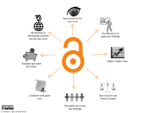This week, we highlight the upcoming AMWA 2023 meeting in Baltimore and the first Global Summit on Diamond Open Access in Mexico. We watch the recorded sessions from the Metascience 2023 Conference, and we read about 22 new transformative agreements between Wiley and North American institutions. We also read about the current landscape of data sharing from PLOS’s viewpoint, about critical appraisal tools, and about a year of Japan’s first national preprint repository, Jxiv. Finally, we read a blog about the need for disruptors to progress open science from Alison Mudditt.
To engage with:
AMWA 2023 heads to the Charm City via AMWA
This year’s meeting of the American Medical Writers Association (AMWA) will take place in Baltimore, MD, between 25 and 28 October, and registration is now open! The focus of the conference is Trends and opportunities for medical communicators, and attendees have been promised a variety of educational sessions, including roundtable discussions, plenary sessions, workshops, posters and more. For full details of the sessions and events happening at AMWA 2023, see the session list.
The first Global Summit on Diamond Open Access via Sched
The first ever Global Summit on Diamond Open Access will take place in Toluca, Mexico, between 23 and 27 October 2023. Organized by open science organizations from around the world, the summit will host a series of hybrid and multilingual events focusing on diamond open access. Highlights of the summit will include the 4th International Congress of Redalyc editors, the 2nd Meeting of AmeliCA members, and the 2nd Diamond Open Access Conference. Registration and tickets for the summit are now available.
To watch:
Metascience 2023 Conference via YouTube
Focused on improving research systems and practices, the Metascience 2023 Conference took place at the beginning of May in Washington, DC. Now, all recorded sessions from the conference have been made freely available to watch on demand. Featured speakers included Pierre Azoulay (Professor at the MIT Sloan School of Management), Michael Nielsen (Research Fellow at the Astera Institute), Emily Sena (Professor at the University of Edinburgh), and Brian Nosek (Executive Director at the Center for Open Science).
To read:
Wiley is feeling 22: new open access agreements in North America via STM Publishing News | 2-minute read
Publishing giant Wiley has announced 22 new open access agreements with institutions and organizations across the USA and Mexico. Beginning this year, these agreements include partnerships with universities, individual research labs, and academic consortia, allowing researchers from these institutions to access all of Wiley’s hybrid and subscription journals free of charge. It also allows these researchers to publish their research open access in Wiley journals. In total, the agreements cover 117 institutions across North America, and a full list of participating institutions can be found at the bottom of this page.
Data sharing is caring via PLOS | 5-minute read
Open data and data sharing are becoming the norm rather than the exception. Now, sharing data when research is published is often expected – or even mandated – by publishers, institutions and funders. This blog post by PLOS looks at how data sharing has become increasingly common, what open data actually means in the real world, and how researchers can meet new and changing data sharing requirements with ease.
Evaluating critical appraisal tools via The Publication Plan | 2-minute read
Critical appraisal tools are defined as “structured checklists that facilitate the assessment of quality, reliability, and relevance of clinical evidence”. These tools provide a way of assessing research data in terms of their validity, trustworthiness, importance and applicability to clinical practice. Similar to reporting guidelines like PRISMA and CONSORT, critical appraisal tools are increasingly being used in research manuscripts to communicate the importance of the research. However, though initiatives like the EQUATOR network exist to assess, collect and promote reporting guidelines, no similar initiatives exist for critical appraisal tools. To remedy this, this blog post takes a deeper look at some websites that have begun to compile critical appraisal tools, including CATevaluation, SR Toolbox and Quality Assessment and Risk of Bias Tool Repository.
A year of Jxiv – Japan’s national preprint repository via The Scholarly Kitchen | 15-minute read
Japan’s first national preprint repository, Jxiv, was launched by the Japan Science and Technology Agency (JST) in March 2022. The profile of preprints in Japan is generally low and, perhaps because of this, the growth of Jxiv users over the past year has been modest: by the middle of May 2023, only 177 preprints had been uploaded. This blog post, written by Matthew Salter (CEO of Akabana Consulting LLC), looks at the preprint landscape in Japan, the performance of Jxiv in its first year, and what the future holds for the preprint repository.
Open science needs disruptors to progress via PLOS | 8-minute read
In the second of a series of four blog posts on how to collectively change publishing for the benefit of all, Alison Mudditt (CEO of PLOS) argues that the status quo of publishing must always be questioned by those with a desire to improve the systems and infrastructure that underpin it. Alison shares what PLOS is doing to disrupt the publishing status quo, including how it is tackling the reproducibility crisis in published research and how it is trying to change behaviours in the publishing world as a whole.
Enjoy reading our content? Then make sure to follow us on Twitter and LinkedIn for regular updates!






